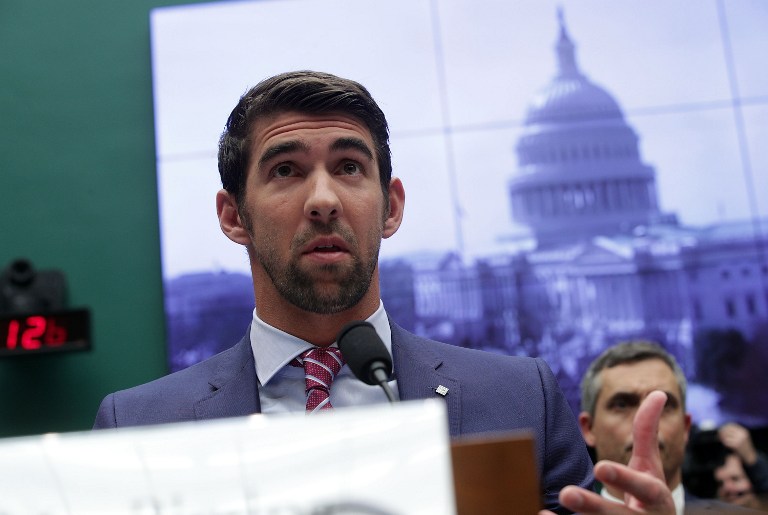
American swimmer and Olympic gold medalist Michael Phelps testifies during a hearing before the Oversight and Investigations Subcommittee of House Energy and Commerce Committee February 28, 2017 on Capitol Hill in Washington, DC. The subcommittee held a hearing on “Ways to Improve and Strengthen the International Anti-Doping System.” Alex Wong/Getty Images/AFP
US swimming legend Michael Phelps called for an urgent overhaul of global anti-doping procedures on Tuesday as the top American drug czar accused the International Olympic Committee of dragging its feet over reform.
Phelps, the most decorated Olympic athlete of all time who retired after last year’s Rio Games, told US lawmakers investigating doping on Capitol Hill that the IOC should make more resources available to the World Anti-Doping Agency.
“In my opinion this is something that needs to be handled today,” Phelps told the House Energy and Commerce subcommittee on oversight and investigations.
READ: We’ll never see another Phelps, says coach
“We need to find whatever the way is to figure out this issue. If that’s more money, it’s more money,” Phelps added.
Questioned on how long it would take to achieve reform, Phelps could not offer a timeframe but warned that doping scandals were “crushing” sport.
“That’s what’s frustrating to me as an athlete that spent over 20 years in the pool — I’m glad people are actually starting to take it seriously and take this in a serious matter,” Phelps said.
“Because it is crushing sports for our youth and everybody else.”
‘Gold and side of fries’
Phelps was joined by 2004 Olympic shot put champion Adam Nelson, who had to wait nine years to receive his gold medal after Ukrainian drug cheat Yuriy Bilonoh was stripped of the title after a doping violation in 2013.
Nelson gave moving testimony over how he finally received his gold medal, not in a packed Olympic stadium in front of a large crowd of roaring fans, but in an airport fast food restaurant.
READ: Schooling stuns Phelps to win Singapore’s 1st ever gold
“It came with a side of fries and a free toy,” Nelson quipped.
Later, the shot put veteran said reform would need to encompass changing attitudes towards doping from the bottom up.
“I still know for a fact there are parts of the world where doping is part of the culture,” Nelson said.
United States Anti-Doping Agency chief Travis Tygart meanwhile pinpointed the overlap between the IOC and WADA as part of the problem, calling for a clean separation of powers between the two bodies.
READ: Phelps wins 19th gold as Peaty ends 28 years of hurt
WADA’s Foundation Board and executive committee contains more than 20 IOC members while the agency’s President Craig Reedie is also an IOC member.
“We at USADA have advocated for a clear separation between those who promote sport and those who police it,” Tygart said.
‘Fox guarding the henhouse’
“To do so otherwise, we believe, is to encourage the fox to guard the henhouse.”
Tygart said he believed the Russian doping scandal which rocked world sport last year would have been exposed sooner had WADA’s governance “not been hamstrung by its own lack of true independence”.
READ: Swimmer regains world title with doping case win
However the IOC’s medical director Richard Budgett told lawmakers the Olympics movement was already addressing the reforms called for by Tygart.
“The IOC is in the process of removing the fox from the hen house.”
Tygart however was sceptical. “It would be great if it were true,” he said. “We’re still waiting.”
READ: Swimming ‘super-suit’ era refuses to go quietly
The USADA chief said the IOC and WADA could take immediate steps to begin the reform process while funding a properly resourced anti-doping regime.
“Today’s the day. What could happen today? WADA could remove sport from its governance structure because you can’t promote and police,” Tygart said.
“The IOC could take $500 million from its funds and put it in a blind trust to fund WADA and its efforts moving forward,” he added.